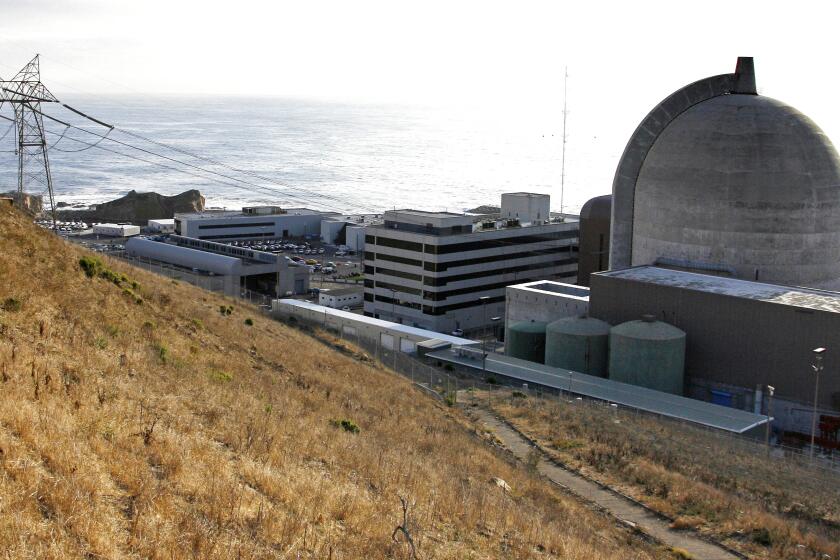California legislators push politics aside to get a big housing deal done

- Share via
SACRAMENTO — When a legislature operates the way it should, big things can happen.
Working right means: Leaders cooperate and jointly use their clout. Lawmakers pushing rival bills team up. People compromise. Pushy special interests are shoved aside.
A textbook example occurred last week. The Senate leader and Assembly speaker agreed on two important housing bills. The measures had been in conflict politically, but not so much substantively. They complemented each other. And it was decided each should pass.
Both bills open commercial land for residential housing, in many cases replacing dilapidated shopping malls, vacant office buildings or run-down motels — or just ugly weed patches.
Local governments are often reluctant to rezone commercial land to residential because businesses generate more property taxes than homes. And they oppose legislation that weakens their local control.
Of course, local government restrictions have contributed to the state’s severe housing shortage. Demand exceeds supply, driving up home prices and rents.
Last week’s legislative agreement broke a years-long stalemate, caused largely by a battle between two labor factions: the State Building and Construction Trades Council — colloquially known as “the trades” — and the carpenters’ union.
The trades demanded that any housing projects be required to use “skilled and trained” labor — a euphemism for union members. The carpenters were fine with just “prevailing wages” — pay that’s generally at the top of the local heap.
Carpenters have claimed there aren’t nearly enough union members to make a union hiring mandate work.
“Let’s get real. There’s no way a union workforce can step in and meet the state’s housing production goals. It’s virtually a nonunion industry,” says Danny Curtin, director of the California Conference of Carpenters.
But the workforce badly needs to be unionized, counters trades president Andrew Meredith.
California Gov. Gavin Newsom is urging the Legislature to pass a bill enabling the Diablo Canyon nuclear plant to stay open for another decade.
“Residential construction workers have been mistreated for generations by developers,” he says.
Democratic lawmakers haven’t wanted to alienate either labor group, especially the more powerful trades. Both are significant campaign contributors. So, certain housing legislation has been stalled for years.
But this time legislative leaders declared enough’s enough.
“They have quite an impact with members. They divide and conquer,” Senate leader Toni Atkins (D-San Diego) told me. “We said that’s not going to work.”
“We’re trying to respond to the [housing] crisis,” she added. “At some point we have to figure out solutions. Everyone involved from the carpenters to building trades finally had to come to the table, realizing we can’t get anything done if we don’t do it together.”
Legislators have been pressing their leaders for action on housing because they’ve been hearing from angry voters.
Atkins and Assembly Speaker Anthony Rendon (D-Lakewood) declared both bills should pass — and let everyone know they’d make sure it happens.
With that muscle behind them, both bills are a virtual cinch to pass before the Legislature adjourns its two-year session Wednesday. Gov. Gavin Newsom will eagerly sign both.
Developers will have an option: They can build under whichever new law they choose.
AB 2011 by Assemblywoman Buffy Wicks (D-Oakland) does not include a union hiring mandate. But it does require prevailing wages. It’s strongly backed by the carpenters.
Gov. Gavin Newsom is caught between two top priorities, columnist George Skelton writes, as he tries to be a global leader on climate change and promises to build more housing.
SB 6 by Sen. Anna Caballero (D-Merced) requires both union hiring and prevailing wages. It’s pushed by the trades.
The purpose of Wicks’ bill is to produce affordable housing for low-income people. A certain percentage of units must be affordable — a requirement that doesn’t please developers.
Caballero’s measure is targeted at middle-class housing. It doesn’t require affordability. But local governments still could.
AB 2011 exempts projects from the developer-dreaded California Environmental Quality Act, or CEQA. The law requires a lengthy process of analyzing a project’s environmental effects and reducing negative impacts. It’s often abused by housing opponents who file lawsuits that drag on for years, prompting frustrated developers to abandon their projects.
“We make it really easy for opponents of housing to obstruct,” says Sen. Scott Wiener (D-San Francisco), who has authored several CEQA-exemption bills. “We need to put an end to that nonsense.”
Caballero’s bill does not contain a CEQA exemption for projects. But it offers regulatory streamlining.
Compromising on Wicks’ bill led to amendments exempting its provisions from vacant land in very high fire zones and within 3,200 feet of an oil well or refinery. Also banned were buildings over 65 feet tall in a coastal zone.
“We didn’t go into this to have one side win at the expense of another,” Rendon said. “As a result, we have a housing victory that checks off a lot of the boxes: affordability, mixed-use, transit accessibility and labor [protections].”
Too many boxes for Dan Dunmoyer, who heads the California Building Industry Assn. He complains about all the conditions a developer must meet.
“By the time all the boxes are checked, there won’t be as much building as they think,” he says.
But he praises Wicks and Caballero: “Two courageous legislators who stepped up and got labor to the table. That’s very, very positive.”
They also were smart enough to join forces months ago to get both their bills passed. Wicks was the newly appointed chairwoman of the Assembly housing committee. Before that, Caballero’s bill was stuck in Assembly limbo — the victim of typical interhouse rivalry.
“It got kidnapped by the Assembly last year,” Caballero says.
Until last week, Wicks’ bill faced an uncertain fate on the Senate floor.
Now both measures will perform end-of-session parliamentary gymnastics and become law, opening more sites for housing. A big thing.
More to Read
Sign up for Essential California
The most important California stories and recommendations in your inbox every morning.
You may occasionally receive promotional content from the Los Angeles Times.
















